


Excerpts from Her Excellency Interview with the Spanish News Agency EFE , February 1st 2008:
" Once we talk about Syria, we do talk about history itself. Damascus is perhaps the only City in world in which the history of all nations came together, where many of our history start; Damascus, therefore, is a unique palace. The history of Damascus, past and present, teaches us that varied cultures and religions could coexist and prosper, exchange richness, enabling societies themselves to be richer, rather than to exchange threats. This is the message of Damascus for the year 2008- as the capital for Arab Culture- "
" During the 8th Century , scientists and researchers from all of Europe flocked to Andalusia, interacted with Islam, which provided them with a new vision, rich prospects for the future; henceforth, science, arts, culture and agriculture flourished. This is a unique message. For Syria and Spain, we have the same ancestors , which makes us members in the one family. I think that Syria and Spain could play a pivotal role on the international arena, especially amid the ongoing talks about the so-called clash among civilizations. Spain has played a leading role in ‘ Civilizations Alliance’ sponsored by the UN; Syria strongly supports this. Our history and modern experience continue to demonstrate different realities of tolerance and coexistence, which should be disseminated to the world. Dialogue should not only aim at convincing others with certain viewpoints, but should, further, aim to cooperate with them as to create new visions."
"I share Her Majesty Queen Sofia of Spain the same desire for peace and stability prevailing all over the world. For me, the search for peace and stability can not be separated from hope, opportunity as other synonyms for education and prosperity."
" Many promising opportunities do exist in Syria. This motivates me every day. This is perhaps more clear when it comes to the Syrian Youth, where 60 percent of the Syrians are under 25 years old. They do not only have the key for our prosperity, but, are indeed an active part in our present."
"For change and development to be a success , they should be carried out by and for the Syrians, rather than by or through others. Syria witnesses an accelerated social political and economic development expanding the horizons of business, handling of new challenges, developing new industries. At the political level, for example, Syria is the only Arab country where the woman holds the position of the Vice-President."
"For development process to be successful and sustainable, the direct beneficiaries should be part an parcel of this process participating actively in it. Syria carries out a new form of change based on the linkage between what results from our self circumstances and others’ experience, as to get interacted making use of both success and failure points of such experience."
" I have been grown up in two civilizations, which makes me having my own special vision in being able to see the two sides of the coin, enabling me to play my role as a mother and as a public figure."
" We have to encourage our children to think beyond closed borders, supporting them as to discover their capabilities and learn by their experience. We do not have even to fear as not to teach our children to carry out calculated risks, even playing with fire; what matters is their ability to evade getting burnt ."
" We lead a normal life like every Syrian family. Of my top priorities is to spend time with my husband, children, the big family- the Syrian Citizens- and friends. We enjoy spending some time outside the house. We are fortunate to have diverse climate in Syria enabling us to practice much of sport and activity outside the house. We are a family fond of bicycle riding ; even my three-year-old son rides a bicycle. We enjoy visiting archeology place in Syria, which has more than three thousand archaeological posts. It is so important for me spending rich time with my family providing my children the love and support which they need."
Edited and Translated by
Mohamad Abdo Al-Ibrahim



Her Excellency, Mrs. Asma Al-Assad has been nominated, February 24th 2008, by the Arab Woman Participation Studies Centre, in cooperation with the Arab League, as the First Arab Lady for the year 2008. Mrs. Al-Assad has been chosen for this prestigious title in recognition of her strenuous efforts in bolstering of the human development, especially as far as the bringing up, enabling and upgrading the youth capacity as to deal with the 21st Century challenges.
Dr. Karim Firman, the Centre Administrative Council President considered the nomination of Her Excellency, Mrs. Al-Assad, as a recognition of her persistent work, patronage and numerous initiatives for educational, rural development, culture and heritage projects, on top of which FIRDOS, the Fund for Integrated Rural Development of Syria, word links, and Masar.
Dr. Shikour Al-Ghamari, member of the Centre Administration Council and of the State Council in the Sultanate of Oman, described the Award as a gesture of loyalty from Arab Civil Society Organization for Her Excellency, Mr. Al-Assad for all of what she has been offering of continued sacrifices at the service of the homeland causes and human development.



DAMASCUS - When Mohammad Ali al-Abid was elected first president of Syria in 1932, his wife, Zahra al-Yusuf, asked if she could attend the official function at the presidential palace. Her husband muttered, "You attending a state function, filled with men. It's impossible Zahra; what do you want people to say?"
The 47-year-old first lady, born into Damascene aristocracy, refused to take no for an answer. She began to slowly push the red lines and play a greater role in public affairs - well into the 1940s, long after her husband's death in 1939. She headed several charity organizations, like the Goutte de Lait, the Red Crescent and Syrian branch of the International Red Cross, in addition to an intellectual forum, and obtained the Syrian Medal of Honor (Excellence Class) after her husband left office in 1936. Additionally, she obtained the Red Cross Medal of Honor in Gold - being the first Arab woman to win such an honor.
For over 60 years, the role of Arab first ladies was confined to just that; charity organizations, intellectual forums, and official ceremonies. These duties were new, coming out of 400 years of the Ottoman Empire where women were completely absent from public life. Things changed dramatically, however, in recent years with the coming of three young first ladies to power in Doha, Amman, and Damascus.



The First Lady of Syria at Harvard
America is notorious for its policies concerning our region, but it is also a great country with many achievements, among its greatest, in my opinion, is its educational system. This statement comes from someone with first hand experience with the Syrian, French and British educational systems.
Allowing that American universities are the best in the world, among them Harvard ranks at the very top, and the Harvard Business School is the jewel of the Harvard crown. To this school the brightest students go to study business theory and practices, and it was to this school that I headed with my family last week. The reason behind the visit could not have been more exciting: the students have elected Syria to be their theme of study and research. For a whole month they have researched the newly emerging business environment in Syria, and the initiatives taken by various civil societies and NGOs. On April 29, at 8 am, the students of Professor Robert Eccles started discussing one major project undertaken by NGOs in Syria; that of establishing a children’s educational park in Damascus in the now vacant old grounds of the Damascus International Exhibition.
And who was the invited guest from Syria chosen to discuss the whole project? None other than Syrian First Lady Asma al-Assad.
At 8:30 am (sharp), a video-conference with the first lady was set up. Beginning the conference with icebreakers, the first lady told the students about a student’s delegation from Harvard that met with her a fortnight earlier. For the following 90 minutes, the first lady, from her office in Damascus, my husband and I in the auditorium at Harvard, and a number of invited guests followed a fascinating discussion and analysis of the children’s educational park project presented by the students. The discussion highlighted any potential problems, dissected all aspects of the project management, debated the possible cultural misunderstandings among the various stake holders of the project, and wondered about possibilities and expectations upon the completion of the project.
Following the discussion, Assad gave her own reflections on what the students had presented, and reminded them that this project is a unique experiment in developmental education that is arguably unparalleled around the world. She was friendly, passionate, candid, and straightforward, her attitude completely down-to-earth and non-ceremonial. Within minutes, it was apparent to my husband and I that she had won the hearts and minds of some of the brightest students on the planet.



Syria’s first lady meets the Indian poor
New Delhi, June 18 (IANS) Syria’s first lady Asma al-Assad, the wife one of the world’s most powerful leaders, Wednesday drove to a slum in the Indian capital and interacted with its women to learn about micro-financing. A graduate in computer science from King’s College in London, the 33-year-old spent about an hour in Harsh Vihar, close to the Uttar Pradesh border where the slum is home to about 50,000 poorest of the poor.
True to her image as one who likes to interact with people, Asma spoke to a tailor woman and a vegetable grocer among others, with the help of Preeti Sahai, a senior manager of Basix, which promotes micro-financing.
"We demonstrated how to open a no-frills savings account, using just a laptop, a digital camera and a fingerprint scanner," Sahai told IANS. Such accounts are opened in the slum area for its many residents who find it difficult to access banks.
An investment banker earlier, Asma posed several questions to the slum people.
Sahai said: "She interacted directly with three or four women. She had many questions. What will they do with the loans? Do they have insurance? Why did they open this account? What businesses are they engaged in?"
The Syrian president’s wife appeared fascinated by the responses of the slum women, who expressed their desire to go up the socio-economic ladder with the small loans provided to them.
Asma took everyone by surprise by expressing a desire to open an account.
Said Sahai: "We promptly took her picture and scanned her fingerprint. But we could not open an account as she did not have the basic documents."
And Sahai added, jokingly: "She is not really our target!"
Before leaving, Asma greeted some of the slum children and spoke to them.
Earlier, Asma, who founded Syria’s first NGO, the Fund for Integrated Rural Development of Syria (Firdos), interacted with about 30-40 activists working in rural development and women’s empowerment at the Institute of Social Studies in south Delhi.
She spent more than two hours at the institute, double the time she was to spend there, witnessing presentations on capacity-building of elected representations and an artisan project artisans. She also saw a documentary on a south Indian village.
She heard the experiences of a district panchayat president from Haryana, on the challenges and success in combating gender bias.
"She spoke about her experience in the rural sector in Syria and her NGO Firdos," the institute’s A.N. Roy told IANS.
She received a gift of a brass peacock. "The first lady mentioned that she was fascinated by India and wished she had stayed longer," Roy said.
 Interviews
Interviews speeches
speeches National
National International
International Speeches in Arabic
Speeches in Arabic They Said About The President
They Said About The President Domestic
Domestic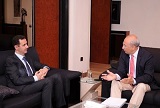 News And Analysis
News And Analysis Pictures
Pictures 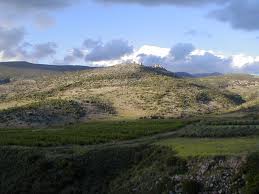 Golan
Golan الجولان بين مطرقة الاحتلال و سندان التلوث
الجولان بين مطرقة الاحتلال و سندان التلوث

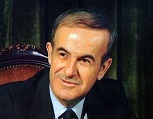 Interviews
Interviews Speeches
Speeches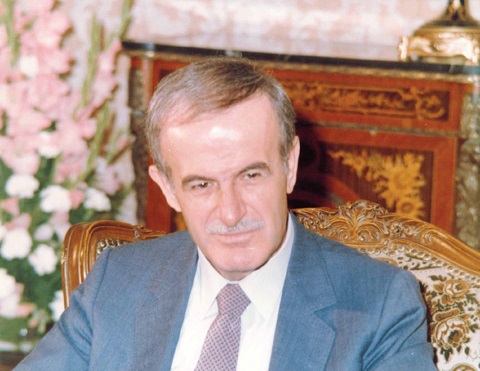 Words
Words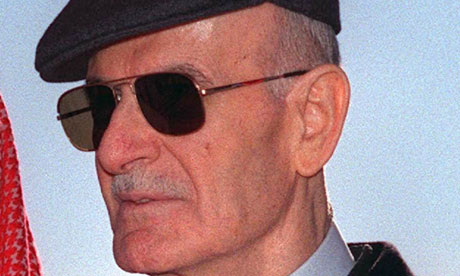 Pictures
Pictures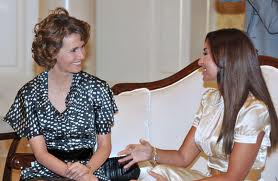 News
News  Excerpts from Mrs. Al-Assad Statements
Excerpts from Mrs. Al-Assad Statements CV
CV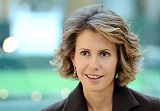 Pictures
Pictures